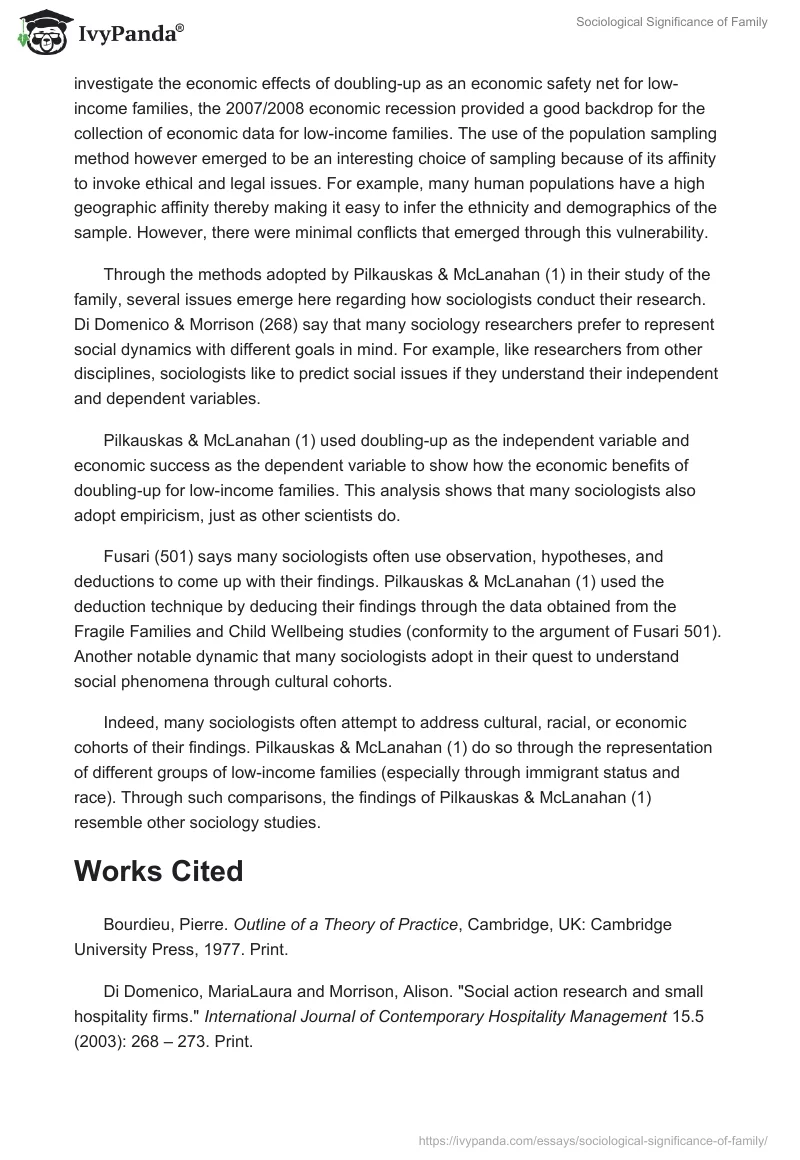Who are parents? We instinctively know that the people who raised us are our parents, but what does that actually mean? Is it solely defined by biological ties, legal status, or something entirely different? The sociological definition of parents digs deeper, challenging our traditional notions and shedding light on the diverse ways families and parenting roles evolve in modern society.

Image: ivypanda.com
Understanding the sociological definition of parents is crucial because it expands our understanding of family structures and challenges societal assumptions about what constitutes a “normal” or “ideal” family. It prompts us to consider the multitude of ways children are raised, the various individuals who contribute to their development, and the social factors that influence parenting. This article explores how sociology approaches the concept of parenthood, highlighting its key elements, complexities, and real-world implications.
Beyond Biology: The Sociological Lens
Unlike biological definitions that focus solely on genetic ties, sociology views parenthood as a complex social construct shaped by cultural, historical, and individual factors. This means that parenthood is not solely defined by biological or legal ties but is shaped by the roles, responsibilities, and relationships that individuals actively perform and negotiate within a particular context.
Roles and Responsibilities: The Building Blocks of Parenthood
Sociologists recognize that parenting involves a broad range of roles and responsibilities. These roles transcend the traditional biological or legal definitions of parenthood and encompass various dimensions of care, guidance, and emotional support. For instance, a parent might:
- Provide material resources and shelter
- Offer emotional support and nurturing
- Establish boundaries and expectations
- Foster social and emotional development
- Guide educational choices and life skills
- Instill cultural values and traditions
These roles can be assumed by individuals who are not biologically or legally related to the child, such as adoptive parents, stepparents, foster parents, grandparents, aunts, uncles, or close friends. It also acknowledges that within a family unit, different individuals might take on different parenting responsibilities and may share the burden of care, creating a web of interconnected roles.
Social Factors Shaping Parenthood: A Multifaceted Approach
:max_bytes(150000):strip_icc()/anomie-definition-3026052-v1sf2-7d07256036904ef9be0b25ae27814139.png)
Image: www.thoughtco.com
Cultural Influences: Shaping Values and Expectations
Cultural norms and expectations heavily influence how we perceive and practice parenthood. Societal values, beliefs, and traditions contribute to different parenting styles, child-rearing practices, and the overall expectations placed on parents. For instance, in some cultures, extended family members play a significant role in raising children, while in others, individual nuclear families take primary responsibility. Furthermore, cultural ideas about gender roles can influence how parenting responsibilities are divided among mothers and fathers.
Historical Context: Shifting Norms and Transformations
The historical context in which families exist also profoundly impacts the definition of parenthood. Throughout history, family structures have been in constant flux, reflecting evolving social and economic realities. The rise of industrialization, changing gender roles, and technological advancements have reshaped the family unit and redefined expectations surrounding parenthood.
For example, the rise of dual-income households has led to a shift in responsibilities, with mothers and fathers increasingly sharing childcare and housework. Similarly, the legalization of same-sex marriage has opened new avenues for non-heterosexual couples to form families and become parents, further expanding the sociological definition of parenthood.
Social Class and Economic Position
Socioeconomic conditions impact parenting experiences and the resources available to families. Parents from different socioeconomic backgrounds face different challenges and opportunities in raising children. Access to quality education, healthcare, safe housing, and social networks can vary widely based on social class, impacting children’s development and life trajectories.
The Changing Landscape of Parenthood: New Trends and Challenges
The Rise of Non-Traditional Families
The modern family landscape is increasingly diverse, with a rise in non-traditional families such as blended families, single-parent families, same-sex parent families, and families created through adoption or surrogacy. These shifts challenge traditional definitions of parenthood and highlight the diverse ways individuals can fulfill the responsibilities and roles associated with parenting.
The Impact of Technology
Technology has significantly impacted family life and the experiences of modern parents. Social media, online communication tools, and access to vast amounts of information have both empowered and challenged parents. While technology can provide a sense of community and support, it also raises concerns about online safety, screen time, and the influence of digital media on child development.
Addressing Challenges and Fostering Positive Change
Understanding the sociological definition of parents allows us to address important challenges facing contemporary families. It highlights the need for policies and programs that support families in their diverse forms, recognizing the various roles and responsibilities that individuals might assume in raising children.
This includes addressing issues such as affordable childcare, paid parental leave, access to quality education, and social services that support families struggling with poverty, addiction, or other challenges. By acknowledging the multifaceted nature of parenthood, society can create a more inclusive and supportive environment for all families and children.
The Sociological Definition Of Parents
Conclusion: Redefining Parenthood Through a Sociological Lens
The sociological definition of parents transcends biological or legal ties, highlighting the diverse and ever-evolving ways individuals assume the roles and responsibilities associated with raising children. By examining the influence of cultural norms, historical contexts, socioeconomic conditions, and the impact of technology, we gain a more nuanced understanding of what it means to be a parent in contemporary society. This knowledge empowers us to challenge traditional assumptions, embrace the diversity of families, and advocate for policies and programs that support all families and children.
Further exploration into the sociological definition of parents can be pursued through various avenues such as academic journals, books on family sociology, and online resources. Share your thoughts and experiences with the diverse ways parenthood is experienced in your own community and contribute to this ongoing conversation.

:max_bytes(150000):strip_icc()/OrangeGloEverydayHardwoodFloorCleaner22oz-5a95a4dd04d1cf0037cbd59c.jpeg?w=740&resize=740,414&ssl=1)




